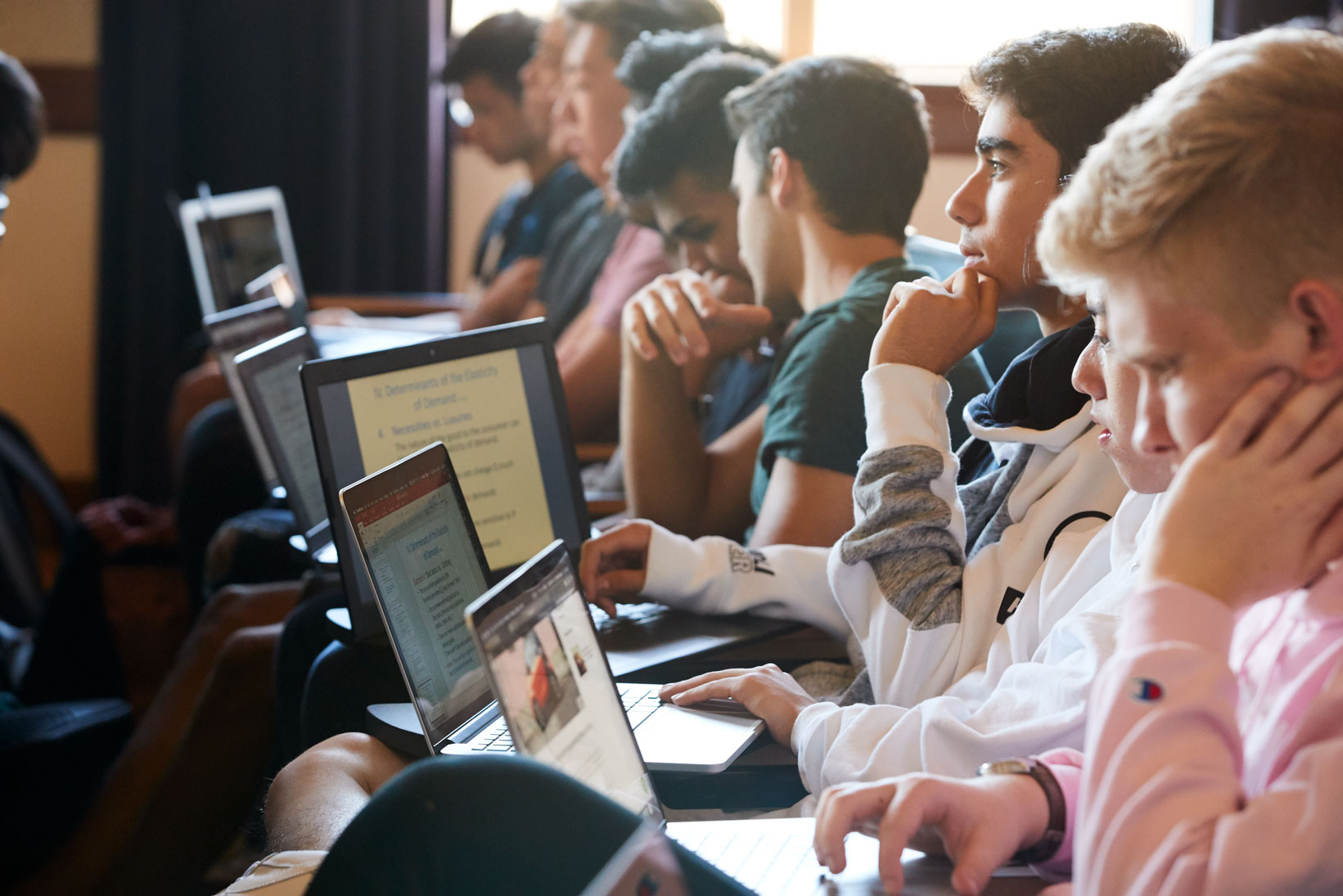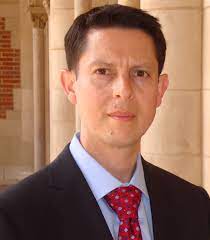Learn Python, a powerful applicable tool used by economists to analyze and visualize data

Apply programming skills to understand various economic and financial issues in society
The UCLA Economics Precollege Summer Institute is offering a three-week-long introduction to Python for Economists. Python is a commonly used programming language for data science. It is a powerful and easy-to-learn tool that can be applied to make simple histograms or fit complicated machine-learning models. This course is a basic introduction to Python for basic data exploration, analysis, and visualization. Students will learn about data types and focus on analysis through a hands-on approach. Students will complete the program with the foundation to recognize data types and manipulate data for visualization and application. The data and examples will mainly come from finance and economics.
Learn from one of the top-ranked economics departments in the world. UCLA’s Economics Department has two interlocking objectives. We conduct cutting-edge research by developing new methodologies and applying them to understand society’s most critical issues. We also seek to train the next generation of economic leaders in the private sector, government, and academia. You will have the chance to work with current undergraduate students and faculty as part of our Economics Precollege Summer Institute. Expand your knowledge of critical economic issues affecting the United States and the world – all while earning college credit and studying at one of the top-ranked economics departments in the world!
Planned topics will include using newly learned skills in Python programming:
- Applications: Probability & Statistics
- Data Analysis
- Basic Regression & Time Series
- Justify various positions based on data
- Problem solve using both analytical and critical thinking to answer both quantitative and open-ended questions
- Lectures will expand on problems that require input from students
- Improve analytical thinking skills to manipulate data and present visual models
Python for Economics and Finance Summer Institute Program
Lecture topics include:
- Data Types
- Flow Control, Functions & Loops
- Numerical Programming (NumPy)
- Basic Math & Array Functions
- Data Manipulation (pandas)
- Visualization
- Basic Regression & Time Series
- Data Analysis Applications
The course grade will be based on class participation, one midterm exam, a cumulative final exam.
During the Python for Economics Institute students will attend or participate in:
- Lectures on economics by UCLA faculty followed by discussion sessions led by UCLA Economics Peer Learning Facilitators
- Apply data analysis using Python on various economic issues, and multiple standpoints
Applications are reviewed and admission to the program is granted on a rolling basis starting February 15th. Applying at your earliest convenience, prior to June 13th, is highly recommended.
The program has application requirements for admission. Eligible applicants who successfully submit all requirements will be reviewed and notified via email of an admission decision within 3 weeks.
Applicants are required to provide the following during the online registration process:
- An unofficial transcript from grade 9 to present reflecting a cumulative GPA of 3.2 or higher
- If your school transcript utilizes a different grading system, please submit your transcript as is. If available, please attach a translation/equivalency guide.
- INTERNATIONAL STUDENTS: If you are an international student, a transcript refers to your complete secondary academic record. To learn more about converting your grades into a US-based GPA, please click here.
- If your school has a translation/equivalency guide, please also include it with your transcript. If you do not have a translation/equivalency guide, please still submit your most up-to-date transcript as is for staff to review.
- Value statement: At the time of registration, ALL applicants will be prompted to submit a few short sentences reflecting on their pursuit of participation in a UCLA Precollege Summer Institute. Please note that students are strongly discouraged from relying on ChatGpt/AI tools for their application responses and are encouraged to submit original and authentic answers.
- A personal statement that is ready to be submitted answering the following:
- In 250 words or less, tell us what distinguishes you from your classmates and peers. What do you expect to gain from participating in the Python for Economics Summer Institute, and what do you hope to accomplish during the program?
- Proof of English proficiency – Citizens from non-English speaking countries ONLY (Citizens of the UK, Australia, New Zealand, Ireland, Singapore, and Canada are exempt from English Proficiency requirements):
- TOEFL – Minimum score of 79 (iBT) or 550 (PBT); IELTS – 6.5 or higher;
- iTEP – 5 or higher;
- DUOLINGO (DET): 105
- CEFR/CAE/CPE – Level C1- Grades A, B, and C;
- International Baccalaureate (IB) or students attending a high school taught in English: students may submit a transcript or verification of enrollment from their school; OR
- Proof of completion in English as a language course
The Python for Economics and Finance Summer Institute will be conducted virtually (online). All meeting times will take place in Pacific Daylight Time (PDT), unless otherwise noted on program schedule and syllabus. Participants must log-in to virtual sessions at the times indicated on the program schedule.
Coursework
Economics 10P; 4 units
Grading
Students will receive a Pass/No Pass (P/NP) upon completion. To receive a “Pass” notation, students must earn a letter grade of C or better. See University Credit, Grades and Transcripts for more information about academic credit.
In order to successfully complete the program, students must not have more than 2 excused or unexcused absences.
UCLA Summer Sessions Summer Scholars Support
Qualified students attending grades 9th – 11th in Spring 2025 in the state of California may be eligible for Summer Scholars Support, a need- and merit-based scholarship offered by the UCLA Summer Sessions Office. Students must be 15 years old by the first day of Summer Sessions 2025 on June 23rd in order to participate in a Precollege Summer Institute and/or apply for Summer Scholars Support. A limited number of full and partial scholarships are available to support enrollment in SCIP/eSCIP, one Summer Course, or a Precollege Summer Institute.
Summer 2025 deadline to apply: March 15.
Program Dates: July 14, 2025 – August 1, 2025
Program Type: Virtual
Program Eligibility: 9th-12th grade in Spring 2025*
Application deadline: June 13, 2025
Enrollment deadline: July 11, 2025
*All participants must be at least 15 years of age by the first day of Summer Sessions 2025 on June 23rd, no exceptions allowed.
The schedule and syllabus are subject to change. Enrolled students will be given updated materials closer to the program start date.
Fees and Payment Info
The program fee includes the unit fees for the UCLA coursework offered as part of the program and thus varies by UC student status. In addition to the program fee, students are assessed other campus and administrative fees during the summer. This is a summary of fees that commonly apply to the selected student type.
Actual tuition and fees are subject to change by the University of California. Visit the fees, payment, and financial aid section for important disclaimer, as well as more details on fees, payment instructions, and information on delinquency, refunds, and financial aid.
Meet your instructors
Dr. Randall R. Rojas
Adjunct Associate ProfessorLeading the UCLA Python for Economics and Finance Summer Institute is Professor Randall Rojas. Dr. Randall R. Rojas is an Adjunct Associate Professor of Economics at UCLA. His research interests entail a highly interdisciplinary endeavor that transcends disciplinary barriers. His work in Economics is predominantly in the field of econophysics and financial engineering where he applies principles from physics, statistics and psychology to the study of financial markets.
He is also an active researcher in the field of Cognitive Science where he applies Bayesian methodologies to the modeling of knowledge acquisition by humans (human causal learning). His current work in Astrophysics (mainly astrostatistics) focuses on developing novel statistical analyses of the large-scale structure (LSS) of the universe to better understand its rich complexity and history. Dr. Rojas is also highly committed to his teaching responsibilities and was recently awarded the ‘My Last Lecture Award’ by UCLA’s Alumni Scholars Club (2015 recipient).
Education:
Ph.D. Statistics – University of California, Los Angeles
M.S. Statistics – University of California, Los Angeles
Ph.D. Physics/Astrophysics – Drexel University
M.S. Physics – Drexel University
B.S. Astrophysics- University of California, Los Angeles
B.S. Mathematics- University of California, Los Angeles

Python for Economics and Finance Summer Institute FAQ
Basic laptop or computer on which they can download datasets and download Python (just about any computer will do).
No, this is an introductory course.
Still have questions? Check out the general Summer Institutes FAQ.

